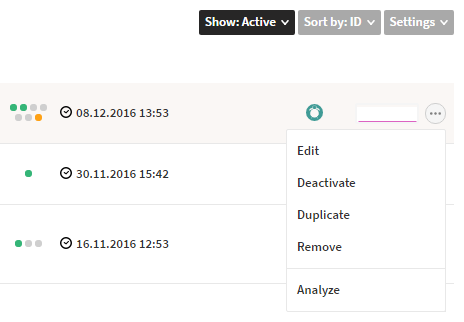Frosmo "Old Bank" 2016-12-19
2016-12-19 at 08:30 (admin.inpref.com)
The Old Bank release contains minor improvements and bug fixes.
Improvements
-
Frosmo Administration Panel: The Modifications > Overview page now provides a quick menu for each modification, allowing you to:
-
Edit the start time, end time, display days, and display hours for the modification.
-
Activate or deactivate the modification (you cannot activate invalid modifications).
-
Create a duplicate of the modification.
-
Remove the modification.
-
Open the Analytics view for the modification.
The following figure shows the menu for an active modification.

Figure: Modification menu -
-
Frosmo Administration Panel, Modifications > Overview > Modification: The Analytics tab now shows the statistics for unique displays, true displays, and clicks.
-
The Preview Tool has been updated to use the latest version of the React library.
-
The Preview Tool now allows you to activate and deactivate test mode in the browser. To toggle test mode, open the Info view, and, under Visitor information, select or deselect Test mode.
-
The Frosmo Core library has been updated with further improvements and fixes.
Bug fixes
-
Frosmo Administration Panel, Data Management > Segmentation > Segments: Duplicating a segment now places the duplicate in the same segment group as the original segment, assuming the original segment belongs to a group. Previously, duplicates were ungrouped.
-
Previously, when checking if a string (such as a URL) ended in a specific substring (such as the path part of a URL), the Frosmo Core library incorrectly returned
trueif the substring's length exceeded the string's length by 1 character. For example, if you checked whether the URLhttp://frosmo.com/en/(21 characters) ended in the path/en/resources/manuals/(22 characters), the Frosmo Core library returnedtrueinstead of the expectedfalse. This bug has now been fixed. The bug affected segmentation rules, trigger conditions, and similar functionality that finds strings that end in specific substrings.